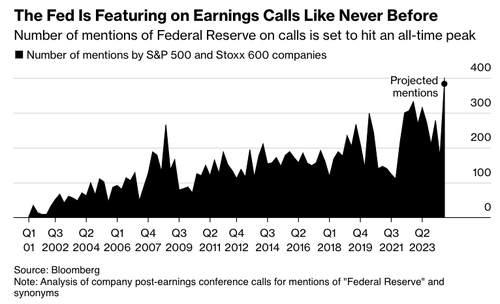The July FOMC meeting confirmed Powell and company are inching closer and closer to embarking on the interest rate cutting cycle. Rate traders are pricing in the first 25bps cut for mid-September. The Fed will only move into a cut cycle if inflation data cooperates and economic activity deteriorates.
The Fed's interest rate hiking campaign over the last 2.5 years has dented consumer spending and corporate profits, with borrowing costs slowing down the overall economy to tame inflation.
While the first rate cut won't meaningfully make a difference for consumers, some of whom (low/mid-tier) are in rough shape, it will lower borrowing costs for companies big and small.
Bloomberg data shows corporate America's interest in the highly anticipated rate-cut cycle has surged to new record highs in earnings calls.
From S&P 500 and Stoxx 600 companies, management teams mentioning the words "Federal Reserve" on earnings calls hit a new high on data going back to 2001 this earnings season.
"Powell was dovish yday and I think it's a clear message from the Fed they are ready to cut in September (that was already priced) and more pointedly ready to respond to any signs of economic deterioration. We've got nearly 3 cuts priced into 2024 and some optionality on moving 50bp in September. 30 yr rates are close to breaking down. Equities are pricing soft landing, from this level of accommodation it will either take another large scale inflation surprise (but fci now rapidly loosing) or disappointment in economic growth. It's been good news on inflation and I don't see that stopping. Bad news has been good news on growth because there was scope for a lot more accommodation…from here it's a bit harder," Goldman's Will Xu wrote in a note to clients on Thursday.
One primary concern that Goldman analysts have is the weakening consumer.
One week ago, Goldman analyst Natasha de la Grense told clients, "Not a great start to earnings season in Consumer, with very few positive surprises so far. Both high-end consumption and the low-income consumer are weak."
Neil Birrell, chief investment officer at Premier Miton Investors, told Bloomberg, "If we don't get a rate cut soon, the balance of risks will shift from escaping inflation to avoiding an economic slowdown."
Soaring interest in Fed policy on earnings calls comes as no surprise as the Fed's 2.5-year hiking cycle could soon be reversed if rate traders are correct (as of this note, traders are pricing in 3 25bps cuts through EOY).
The July FOMC meeting confirmed Powell and company are inching closer and closer to embarking on the interest rate cutting cycle. Rate traders are pricing in the first 25bps cut for mid-September. The Fed will only move into a cut cycle if inflation data cooperates and economic activity deteriorates.
The Fed's interest rate hiking campaign over the last 2.5 years has dented consumer spending and corporate profits, with borrowing costs slowing down the overall economy to tame inflation.
While the first rate cut won't meaningfully make a difference for consumers, some of whom (low/mid-tier) are in rough shape, it will lower borrowing costs for companies big and small.
Bloomberg data shows corporate America's interest in the highly anticipated rate-cut cycle has surged to new record highs in earnings calls.
From S&P 500 and Stoxx 600 companies, management teams mentioning the words "Federal Reserve" on earnings calls hit a new high on data going back to 2001 this earnings season.
"Powell was dovish yday and I think it's a clear message from the Fed they are ready to cut in September (that was already priced) and more pointedly ready to respond to any signs of economic deterioration. We've got nearly 3 cuts priced into 2024 and some optionality on moving 50bp in September. 30 yr rates are close to breaking down. Equities are pricing soft landing, from this level of accommodation it will either take another large scale inflation surprise (but fci now rapidly loosing) or disappointment in economic growth. It's been good news on inflation and I don't see that stopping. Bad news has been good news on growth because there was scope for a lot more accommodation…from here it's a bit harder," Goldman's Will Xu wrote in a note to clients on Thursday.
One primary concern that Goldman analysts have is the weakening consumer.
One week ago, Goldman analyst Natasha de la Grense told clients, "Not a great start to earnings season in Consumer, with very few positive surprises so far. Both high-end consumption and the low-income consumer are weak."
Neil Birrell, chief investment officer at Premier Miton Investors, told Bloomberg, "If we don't get a rate cut soon, the balance of risks will shift from escaping inflation to avoiding an economic slowdown."
Soaring interest in Fed policy on earnings calls comes as no surprise as the Fed's 2.5-year hiking cycle could soon be reversed if rate traders are correct (as of this note, traders are pricing in 3 25bps cuts through EOY).

